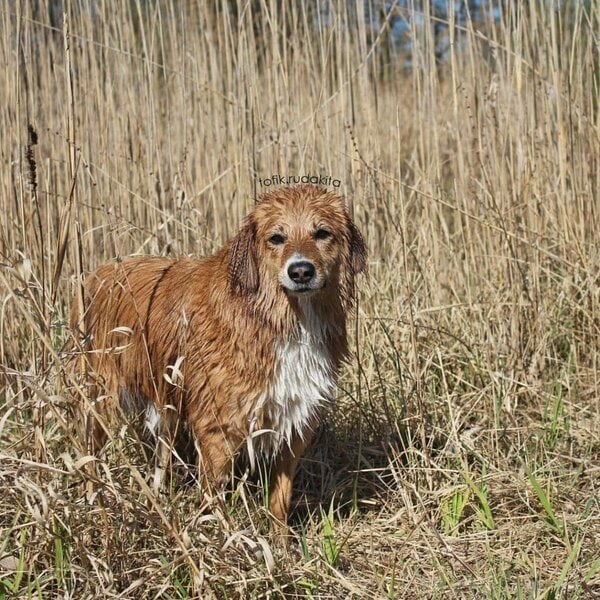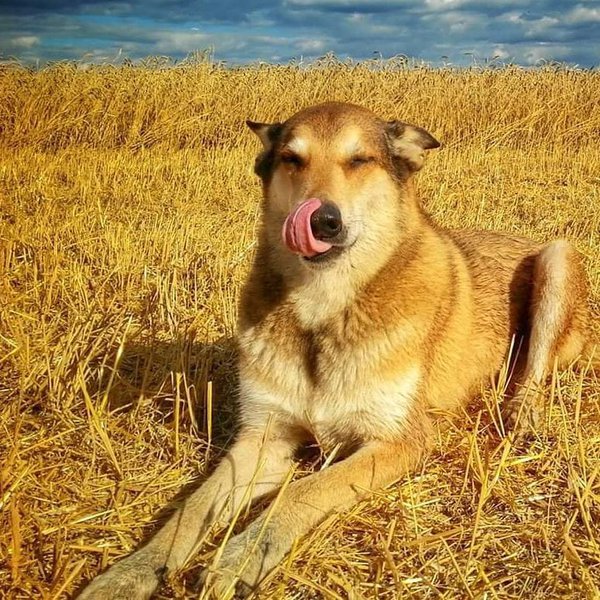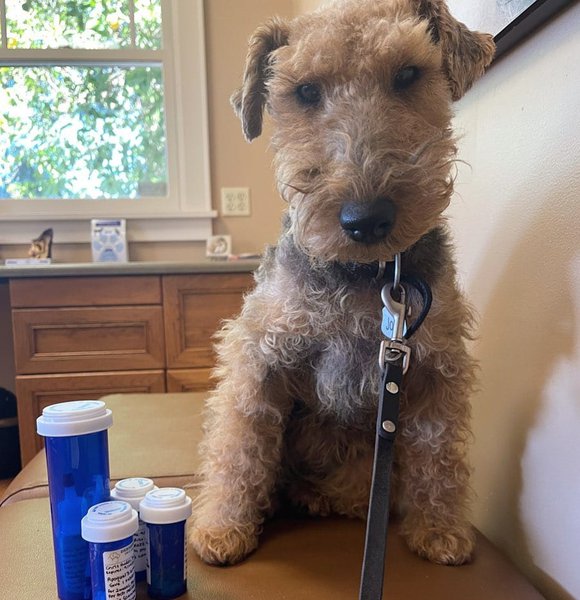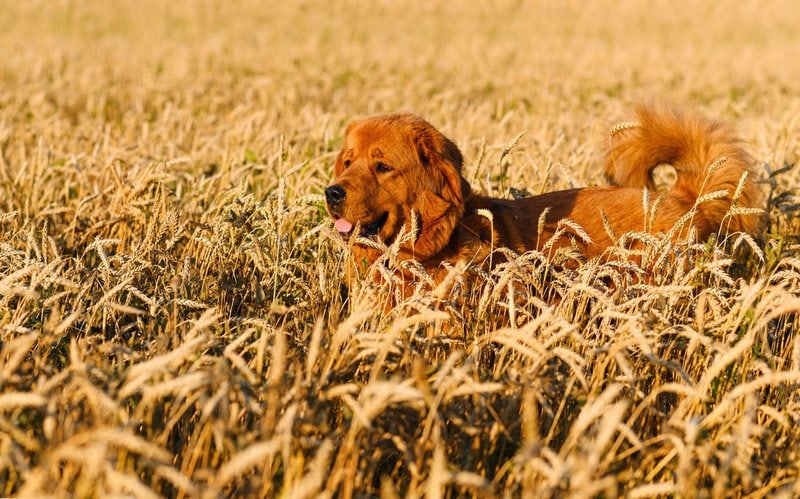Wheat is a common part of a wide variety of dog food, treats, and medication. But questions remain over whether wheat and grains in general, provide a viable and healthy food source for dogs. So, can dogs eat wheat?
Yes, dogs can eat wheat and food substances containing other grains, provided that the dogs do not have a grain allergy. Nonetheless, for dogs with wheat intolerance, feeding them with grain food substances can lead to a myriad of health problems, such as skin infections and issues with their digestive tracts.
Knowledge of food substances that your pooch’s body can’t tolerate is very important to prevent the occurrence of allergic reactions and maintain the dog’s health status. And this is why we have listed some of the ways by which you can tell whether or not your pooch is allergic to wheat in this article. However, before we go further, let’s see whether or not wheat can make dogs sick.
Can Wheat Make Dogs Sick?
Feeding dogs that have grain allergies with wheat can lead to a myriad of health issues such as gastrointestinal disorder, diarrhea, and ear infections, just to mention a few.
Grains typically used in dog food vary, and common examples of these grains include wheat, barley, corn, oats, and millet, among others. That said, it is safe to feed dogs with wheat and food products such as bread, with wheat as a major ingredient, provided such a pooch isn’t allergic to grains.
Wheat is only bad for a dog if such a pooch has a history of allergic reactions to grain, but before completely cutting out wheat from your dog’s diet, it is recommended that you seek professional advice from a vet.
And the reason for this is simple – for dogs that don’t have a grain allergy, wheat is particularly effective at promoting a healthier coat and skin development!

Are Wheat Allergies Common In Dogs?
Wheat allergies are relatively rare in dogs, but it is quite possible for a pooch to suffer an allergic reaction after being fed a diet containing wheat ingredients.
Dogs are certainly allergic to a wide variety of food substances, but one food allergy that has been gaining prominence recently is grain intolerance. For a great number of dogs, food allergies are genetic; Hence, if you have a pooch that is allergic to wheat, it is quite likely that such a dog’s progenies will inherit a wheat allergy.
Most dogs with food allergies typically react to proteins such as beef, chicken, and eggs. But it is also possible for a pooch to develop a wheat allergy after prolonged exposure to food substances containing wheat. Typically, wheat allergy takes years to develop in dogs, but the timeframe for the development of this allergy can also be significantly shorter.

How Do You Know If Your Dog Is Allergic To Wheat?
You can tell that a dog is allergic to wheat when you notice common symptoms of a grain allergy such as itchiness, redness of the skin, and skin inflammation, just to mention a few.
Symptoms of wheat allergies in dogs typically manifest as problems with the pooch’s skin, and some of these symptoms of canine wheat intolerance include:
- Poor coat quality – hair loss and coat sparseness
- Inflammation and redness of the skin
- Ear infections
- Diarrhea
- Excessive licking and chewing of paw pads
- Excessive licking of the anal glands

Medical Examination
Some of the symptoms of wheat allergies in dogs are similar to those observed with some other health conditions; Hence, in addition to observing the symptoms of wheat allergies in your pooch, your vet may need to carry out a comprehensive medical examination to determine with certainty, whether or not your pooch is suffering from a grain allergy.
In case of itchy or dirty ears, your vet will run tests to verify that the pooch’s ear infection is due to yeast or bacterial infection, and not due to the activity of external parasites.
Blood work tests are also carried out on the pooch to rule out other illnesses. And if the dog’s symptoms include diarrhea, the vet may also collect a fecal sample to rule out the actions of intestinal parasites.
Trying An Elimination Diet
Apart from the aforementioned symptoms of wheat allergies, one other way of determining whether or not your dog is allergic to wheat is by adopting an elimination trial diet, which typically runs for several weeks.
The idea behind this wheat, and by extension, grain elimination diet is simple – adding wheat to your dog’s diet in varying amounts to determine whether or not the pooch is allergic to grains.
If you suspect that your pooch is allergic to wheat, you should completely stop feeding such a food with food, treats or medications that contain wheat.
If symptoms of wheat allergy in the pooch subside with the withdrawal of wheat from the dog’s diet, you can then proceed to reintroduce wheat into the pooch’s meals.
And if these symptoms of grain allergies resurface when you start feeding the pooch with wheat again, then it is confirmed that such a pooch has wheat allergies.
How Do You Treat A Dog With Wheat Allergy?
You can treat a dog’s wheat allergies by adopting a wheat-free diet and with the use of medication to treat itchiness and skin infections that may have developed due to the allergic reaction.
Eliminating The Wheat Component
Fortunately, the treatment for wheat allergies in dogs is quite straightforward, and it starts when you stop feeding the pooch with food substances that contain wheat and other grains. Typically, once you eliminate the wheat from the pooch’s diet, symptoms of the allergic reaction will subside, and the dog’s path to complete recovery begins.
In addition to providing instant relief from the symptoms of a grain allergy, adopting a wheat-free diet will also reduce the chances of your pooch developing a chronic infection in the long run.
And this is because, if you continue feeding a dog that is allergic to grain with wheat, such a pooch’s immune system will become weaker over time, thereby leading to recurring skin infections.
Medication
You’ll need a doctor’s prescription to treat wheat allergies that have degenerated into skin and ear infections. Vets typically recommend mild, dog-friendly shampoos to provide relief from itching caused by wheat allergies, and an ear cleaner is usually prescribed to treat ear infections that may develop as symptoms of wheat allergy.
In most cases, chronic skin irritation caused by wheat allergies in dogs takes several weeks to heal. And provided you stop feeding the wheat-allergic do with food substances that contain grain, such a pooch can go on to lead a long and healthy life.






